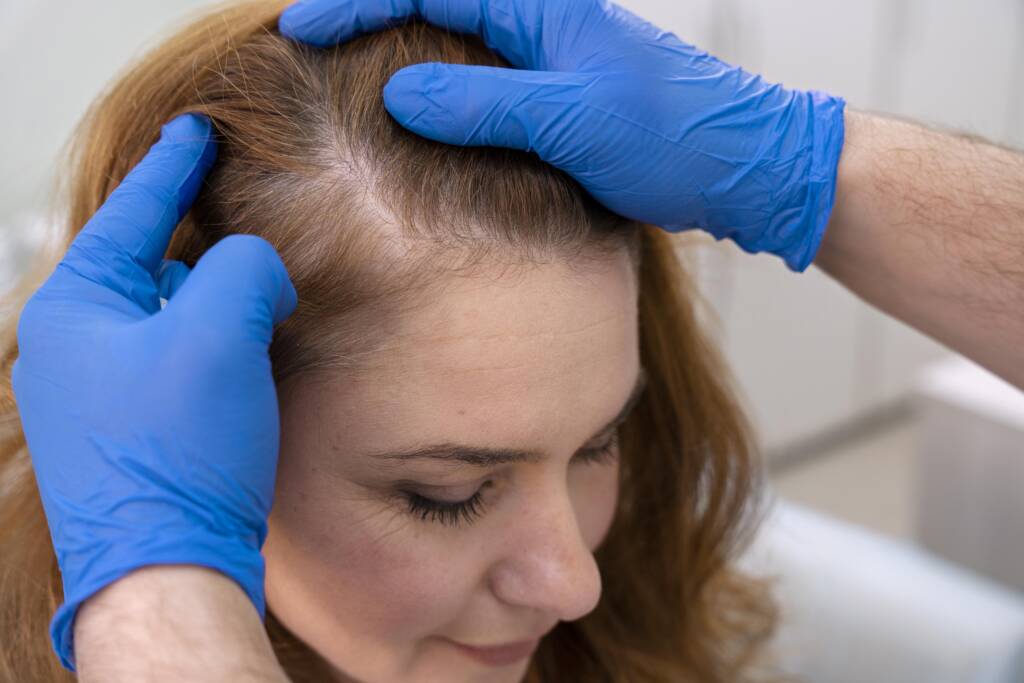
What is alopecia?
Alopecia is the medical term for hair loss. There are many different types of alopecia, each with a unique underlying cause. Only board-certified dermatology providers can diagnose the exact cause of your alopecia. At the Golla Center, our expert providers will take a thorough history of your hair loss and perform a physical examination to determine the exact cause of your hair loss. This expertise is what sets the Golla Center apart from other hair restoration clinics.
There are three types of alopecia and they are Androgenetic alopecia, Telogen Effluvium, Alopecia Areata.
Telogen Effluvium
Telogen effluvium is a common form of temporary hair loss that can occur due to stress, illness, medications, or other environmental factors. It involves the shedding of a number of hairs during the telogen phase, when hair naturally rests before shedding. While this condition can be alarming, telogen effluvium supportive therapy aims to restore healthy hair growth by targeting its underlying causes.
During acute telogen effluvium, a large number of hairs enter the resting phase of the hair growth cycle prematurely. This leads to excessive shedding, which is often triggered by a stressful event, illness, or a sudden change in lifestyle. In contrast, chronic telogen effluvium is when hair shedding persists over a prolonged period, typically beyond 6 months.
Telogen Effluvium may be caused by a number of things.
It can be caused by childbirth, low thyroid, low iron storage, severe stress, and occasionally by certain drugs. Typically this type starts suddenly and the loss is all over, with increased shedding of hairs from the root. Once diagnosed, supportive treatment such as Nutrafol and PRP can provide resolution to the hair loss. In the case of low thyroid or low iron, replacement to normal levels is necessary to restore hair growth. Our board-certified dermatology providers can order and interpret the necessary labs to determine if you have a nutrient or hormonal deficiency.
The telogen phase lasts about 2 to 4 months, but with proper care and telogen effluvium supportive therapy, hair can begin to regrow during the anagen phase, the active growth phase of the hair cycle.
What Causes Telogen Effluvium?
Factors like hormonal imbalances, pregnancy, and stress can push your hair into the telogen phase, leading to temporary hair loss. A diet rich in essential nutrients plays a critical role in preventing excessive shedding and promoting strong, healthy hair.
Additionally, medical conditions such as acute illness or surgery can trigger acute telogen effluvium, whereas ongoing stress or underlying health problems may lead to chronic telogen effluvium. Both conditions can be managed effectively with the right treatment plan.
Several factors can trigger Telogen Effluvium, including:
- Hormonal Changes: Pregnancy, menopause, or thyroid imbalances
- Nutrient Deficiencies: Low iron levels or insufficient essential vitamins
- Stress and Trauma: Emotional stress, major surgery, or severe illness
- Medications: Certain prescription drugs may disrupt the hair growth cycle
- Lifestyle Factors: Rapid weight loss or dietary changes
Identifying the root cause is essential for effective treatment. Our board-certified dermatology providers specialize in diagnosing and managing hair loss, offering comprehensive care tailored to your specific needs.

Treatment Options for Telogen Effluvium
At Golla Plastic Surgery, we offer telogen effluvium supportive therapy that includes level laser therapy, a non-invasive treatment that promotes blood circulation to the scalp and stimulates hair follicles. This technology has shown promise in encouraging healthy hair growth by enhancing the anagen phase, thus improving the overall hair cycle.
Alongside level laser therapy, we may recommend topical treatments, personalized supplements, or changes to your diet rich in essential nutrients—all tailored to your unique condition.
Once the underlying cause is identified, we offer advanced, evidence-based treatments to support hair regrowth and prevent future shedding:
- Nutritional Support: Restoring iron and other essential nutrients through diet and supplementation.
- PRP (Platelet-Rich Plasma) Therapy: This non-surgical treatment uses your body’s natural healing properties to stimulate hair follicles and promote new growth.
- Nutrafol Hair Supplements: Clinically proven to improve hair density and overall hair health.
- Hormonal and Thyroid Management: If imbalances are detected, we work to restore hormone levels to a healthy range.
- Stress Management Guidance: Lifestyle modifications to reduce stress and its impact on hair health.
If you are struggling with sudden hair loss, don’t wait to seek expert care. Our team at Golla Center is here to help you uncover the cause and find the best treatment for Telogen Effluvium. Contact us today at 412-963-6677 to schedule your consultation and take the first step toward healthier, fuller hair.
